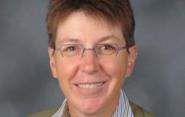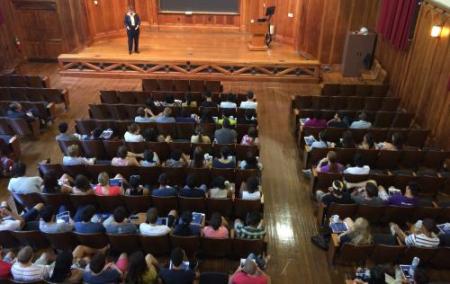What's Engineering at Yale About? Freshmen Hear From the Dean

The many myths about engineers - they’re loners, for instance, or tinkerers with no interests outside their fields of study - were quickly dispelled Tuesday by SEAS Dean T. Kyle Vanderlick in her annual welcome to incoming freshmen.
With their newly acquired SEAS coffee mugs and reading materials, more than 150 students gathered at Sheffield-Sterling-Strathcona Hall to hear Vanderlick’s explanation of what engineering at Yale is about.
 One thing to know is that it’s about a lot more than engineering. “We are completely integrated,” she said. Engineering students are encouraged to explore interests in other fields, whether it’s literature, history or any other interest. “You have to appreciate the whole human condition.”
One thing to know is that it’s about a lot more than engineering. “We are completely integrated,” she said. Engineering students are encouraged to explore interests in other fields, whether it’s literature, history or any other interest. “You have to appreciate the whole human condition.”
Because ultimately, students who come out of the program need to know more than just differential equations and thermodynamics.
“The best way to think about engineering education is that it’s leadership training - it’s a curriculum for leadership in the 21st century,” Vanderlick said. “You need the tools of science and mathematics to address some of the most pressing problems of our time. But they will be solved by people who can communicate, who read, who understand our history. People who have that peripheral vision about what’s important in life.”
So what’s the difference between science and engineering?
“Science is curiosity-based - you want to know why that protein in the body exists, just because you want to know,” she said. “That, at the deepest heart, is what science is all about. You just want to know.”
Engineers also want to know, but that curiosity drives them to find solutions.
“Because, fundamentally, you’re interested in making the world a better place. If you’re interested in engineering at all, you have some sort of drive to actually solve problems.”
Also, some practical advice: If you want to major in engineering, don’t wait. “You can’t let the first couple years go by and then decide to get on the train.” On the other hand, if you do start early and decide a year or two later that it’s not for you, no problem - with the skills you’ve learned, every other degree program’s going to want you.
And about that whole “engineers are loners” idea: Engineering is people-oriented. “You’re going to be working on big, important problems. You’re not going to cure cancer alone,” Vanderlick said. “It is one of the most people-oriented professions and educations you can have. So if you’re a people person, you belong in engineering.”

